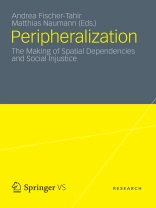Peripheries emerge as a result of shifts in economic and political decision-making at various scales. Therefore peripheral spaces are not a “natural” phenomenon but an outcome of the intrinsic logic of uneven geographical development in capitalist societies. Discussing examples from Germany, Eastern Europe, Turkey, Iraqi Kurdistan, Pakistan, India and Brazil, the volume describes the social production of peripheries from different theoretical and methodological perspectives. In so doing, it argues in favour of a re-politicization of the recent debate on peripheralization.
Зміст
With contributions by Andrea Fischer-Tahir.- Matthias Naumann.- Eren Düzgün.- Benjamin Zachariah.- Thilo Lang.- Tim Leibert.- Alexandru Banica.- Marinela Istrate.- Daniel Tudora.- Anja Reichert-Schick.- Sabine Beisswenger.- Thomas Bürk.- Dolarice Sátyro Maia.- Arian Mahzouni.- Antía Mato Bouzas.
Про автора
Andrea Fischer-Tahir is a social anthropologist and research fellow at the Zentrum Moderner Orient in Berlin. She works on memory, gender, media, knowledge production as well as rural-urban dynamics in the Kurdistan region of Iraq. Matthias Naumann is a human geographer and a research fellow at the Leibniz Institute for Regional Development and Structural Planning in Erkner (near Berlin). He also works as a visiting lecturer at Brandenburg University of Technology Cottbus. His research interests include urban and regional development, infrastructure governance and critical geography.












